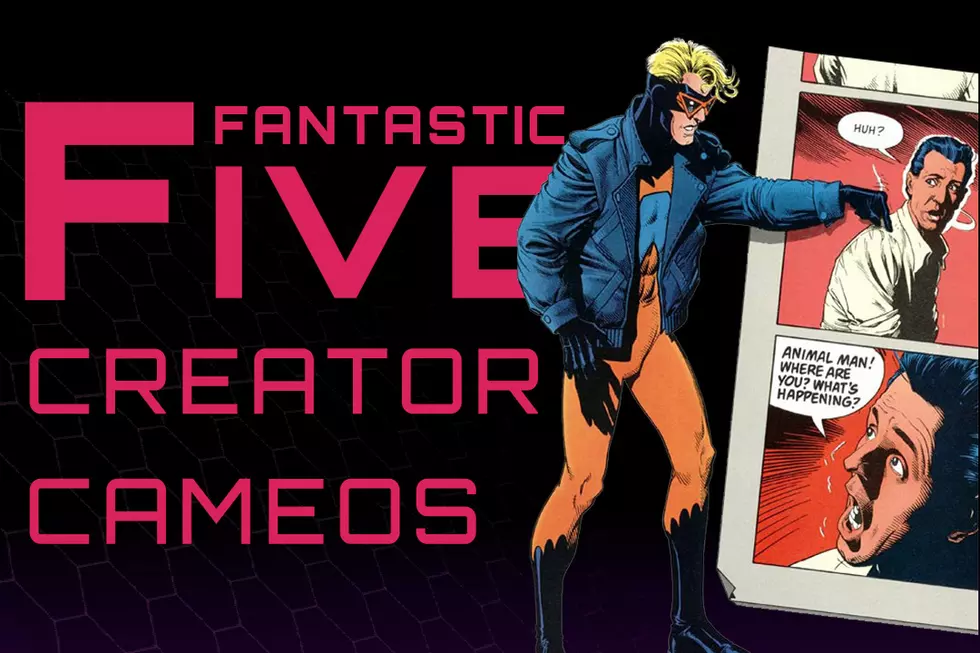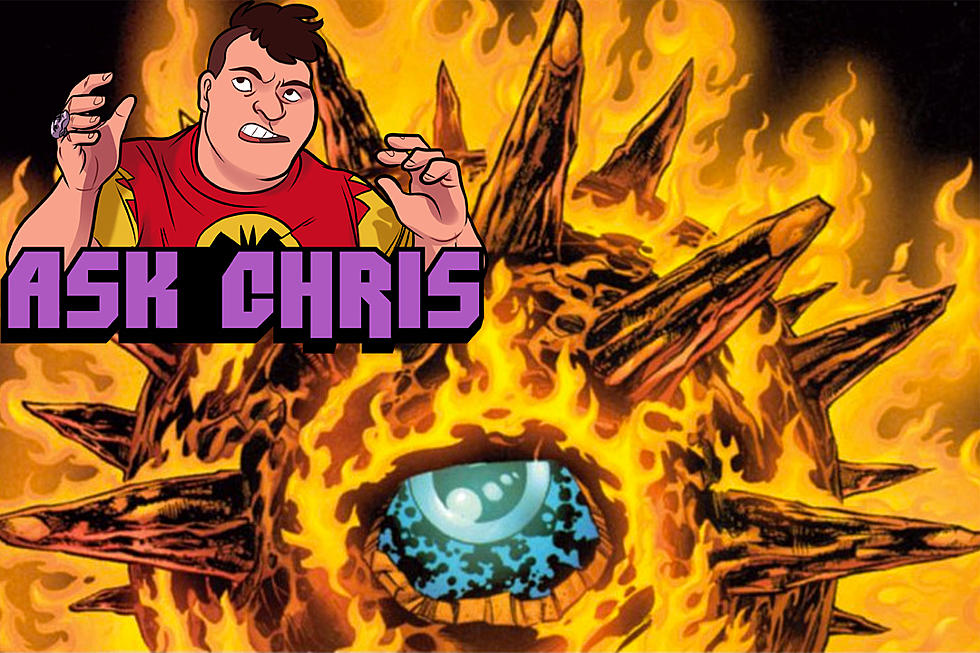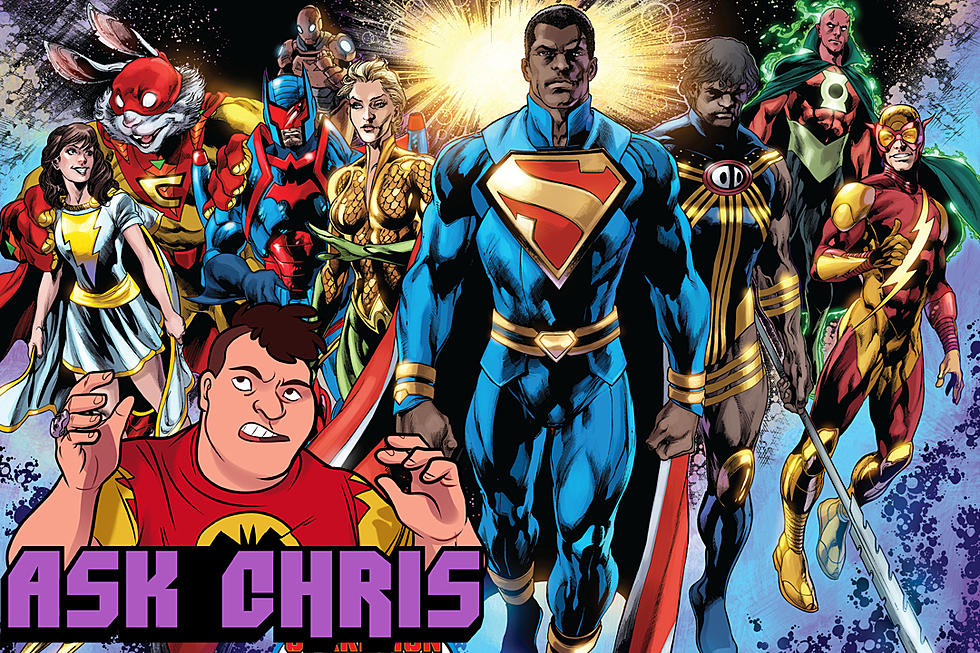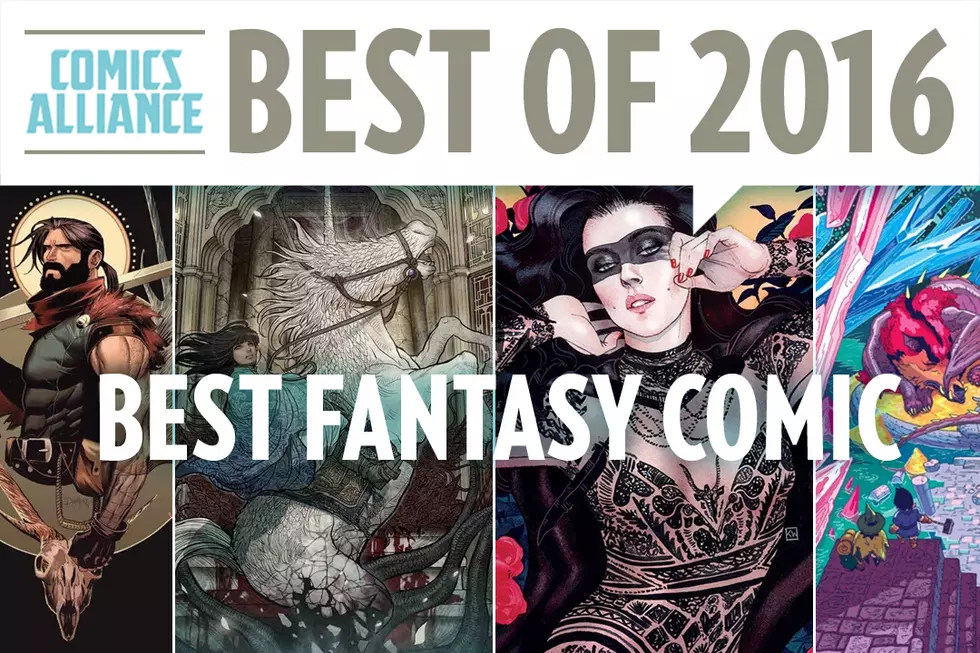![I Want To Make This A Performance: Grant Morrison Discusses His Plans For ‘Heavy Metal’ [Interview]](http://townsquare.media/site/622/files/2015/08/CA_MorrisonMetal-630x420.jpg?w=980&q=75)
I Want To Make This A Performance: Grant Morrison Discusses His Plans For ‘Heavy Metal’ [Interview]
When it was announced last month that Heavy Metal magazine had signed Grant Morrison to serve as their new editor-in-chief, it seemed to be the exact real-world approximation of that comic cliche: a team-up that nobody anticipated, but that makes perfect sense when considered from the right angle.
Heavy Metal is a title that, in its '70s/'80s heyday, redefined the limits of comic book form and content, much as Morrison has eschewed conventional stylistic and genre constraints throughout his career. Today, the magazine's name is shorthand for a specific style of exploitative genre fiction --- usually involving some combination of sci-fi, sword & sorcery, swearing, and sex --- but owners Jeff Krelitz and David Boxenbaum have been vocal about their hopes to expand the Heavy Metal brand and reignite the revolutionary spirit that it originally embodied.
ComicsAlliance sat down with Morrison at this summer's San Diego Comic-Con to talk about his personal history with Heavy Metal, ask some questions about his plans, and get a glimpse into the approach he's bringing to his new role at the magazine.
ComicsAlliance: So, I guess we should start with the question that many people, including myself, have been asking since the announcement; How did you get brought into the Heavy Metal fold, and what make this a project you wanted to commit yourself to?
Grant Morrison: Well, I'd been talking with Jeff [Krelitz] for a long time, and he and David [Boxenbaum], they own the magazine, own the trademark. I'm good friends with Jeff, and he just kinda said, "Wouldn't this be an interesting idea?" and while I haven't read Heavy Metal much since the '80s, I've ducked in and out sometimes, and what interested me most about it was that I grew out of that kind of culture in the '70s.
The first stuff I did was with Near Myths, this Scottish magazine, and it was an attempt to do a British Heavy Metal. So I was seventeen years old at the time, a punk rock kind of kid, and it was just, "Okay, this is the competition, I'm up against these guys."
I always kinda looked on Heavy Metal like that, but obviously, there was no competition [from Near Myths]. The only person on the magazine who was really any good was Bryan Talbot, but the rest of us, we were just starting out… we had this idea that we could be better than Moebius and all those guys!
So coming out of that, this was always sort of a force that I was opposing, and I loved the idea of going back to all the stuff that I loved in the '70s like those Marvel black-and-white books, the Conan stuff, Unknown Worlds Of Science Fiction, the Warren comics, and the new wave science fiction, the stuff that Michael Moorcock and Harlan Ellison were doing. Those were really powerful influences on me in the early days, and this gig just felt like a chance to go back to my roots and see what I would do if I'd been given Heavy Metal back then. What would I have put in there, what would I have wanted to do with it?
CA: That's something I've never realized – there's been a fair bit of history written about the UK editions of comics, the Marvel UK titles and everything, but I had no idea that those magazine format titles got overseas distribution in that era.
GM: Oh yeah! It was quite spotty distribution, but the little porno stores always had them. You'd go into these stores with weird, kinda sexual requisites in the window, or items with pumps and things, and they'd always sell these black-and-white magazines.
So to a teenage kid, you're really embarrassed in this place, there's some middle-aged guy buying a sex toy and you don't even know what it is, some kind of weird clamp thing --- and you'd buy your Unknown Worlds and your Conan and your Heavy Metal, and the Warren Vampiralla stuff, so it felt kinda naughty to go and buy that stuff, y'know?
And coming out of reading the Marvel cosmic comics, the Steve Englehart Doctor Strange, the Jim Starlin Captain Marvel and Warlock, it was just the next logical step. Because suddenly you realize, "Okay, it's this psychedelic head stuff with questioning heroes and existential crises, but with sexy girls and spaceships," and [those magazines] felt like the next jump from that.
So again, this, to me is just about getting back to that feeling, and seeing how I can develop that, because I was a little punk kid, and I wasn't particularly into the sexual L.A. porno aspect of it all, so I'm interested in seeing how I can play with all that.
CA: So, you mentioned your approach as a developing artist was to try to beat Heavy Metal at their own game…
GM: Kinda, yeah. [laughs]
CA: Do you find that to be a valuable quality as a creator, having that aspirational, competitive quality, aiming to be the best, and measuring yourself against not just your peers, but also your influences?
GM: Certainly, especially as a young creator. Once you get older and establish your own career, it doesn't matter so much, but I think as a kid, and certainly coming from music and playing in bands, there's always that competition. You have your own group, you have your scene, but you're always fighting against, someone else and defining yourself against someone else.
I think if you're a young creator and you're coming in and you're bursting to do stuff, you kinda want to replace the old guard. And now that I am the old guard, I'm waiting for them to come and replace me, but I'm hanging on, y'know? [laughs]
CA: I also wanted to step back and touch a little more on something else you just said --- you mentioned being a punk kid, coming out of the punk culture. And though one of the prevailing myths of early punk rock was that it was this huge year zero, burn-it-down-and-start-again movement, there were a lot of obvious antecedents for and influences on the music...
GM: Garage bands of the '60s, glam, the Pebbles stuff, yeah.
CA: So, this over-the-top magazine that sort of built on the hippy psychedelia of the '60s and filtered it through a European anything-goes sensibility… It might seem, on the surface, to be in opposition to to the overall punk ethic, but was it really just another part of the cultural tapestry of that time?
GM: Yeah, it was to me, it all seemed to tie in to science fiction. A lot of the sci-fi at the time was quite adult, quite grown-up, particularly the literary stuff, the stuff that Moorcock and Ballard had been doing. And the whole idea of being a punk was tied into science-fiction, and David Bowie was a huge influence --- even though as punks, we kind of rejected Bowie, we'd all grown up with Bowie. He wasn't allowed in the scene because he wasn't seventeen years old, but he was one of the biggest influences on what we were doing.
So there was that, there was always the element of Bowie. And honestly, if I track it back, it's all kinda about Bowie --- the image, the sexual uncertainty, the obsession with sci-fi, the William Burroughs cut-ups and all that stuff.
CA: Now, I don't think it's a stretch to say that Heavy Metal, after its heyday in the '70s and early '80s, developed an image problem and almost became shorthand for an exploitative style of sci-fi: the hyper-sexualized blood and guns and exaggerated anatomy school. And while initially, Heavy Metal the magazine and "heavy metal" music and culture had shared a name and some common sensibilities, by the end of the '80s, they'd grown much closer.
GM: I know what you mean, it's hard to describe exactly what that is, but we all know it came from those… Motley Crue videos and all that sort of stuff, that Sunset Strip '80s culture seemed to almost take over what Heavy Metal was and then bleed through.
CA: And that's not to say I don't appreciate many of the creators working on Heavy Metal in that time period, but the entire package just didn't appeal to me…
GM: Well, those people are phenomenal, and they kept it all going through a difficult stretch, but I think while it was running, it was at odds with the way the rest of the culture was running. And it was trying to be true to something that maybe was more important and more meaningful ten years before.
I agree with that estimation, and I'm kinda excited because, y'know, I'm a Steel Panther fan, so I see a way to take that material and make it really funny at the same time. I think the story Chris Burnham just did is a great example --- it isn't in one of my issues, but he did this thing called "Milk Run", which is basically the Steel Panther version of a Heavy Metal story from that classic era.
So I think there's an area of that that's fun to play with now, but it shouldn't be the aesthetic of the magazine in the same way. I think we have to pull it away from that. Sexuality and all that stuff is much more sophisticated now, and we have to reflect that.
Back in the day, the only place you could see rayguns and tits was Heavy Metal. That's fine if you're seventeen, but nowadays if you're seventeen, honestly, you've probably seen a million things worse than that, you don't need to go into a magazine store to see sex. And though the sexuality is part of the magazine's spirit, I want to make it much more fluid and interesting.
CA: How would you describe your role at the magazine?
GM: I don't have to do all the serious hard work, I'm really handling more of the aesthetic guidance. I'll be choosing stories, and I'm interested in that because I don't always get to see a lot of new stuff, so it'll be interesting to get these submissions from all around the world and select some of them. And beyond that, I want to bring in some of my own guys, people I think would be interesting in the magazine, and not just artists or writers I've worked with, but also people from the music business who actually love comics.
There was that time in the magazine when they were doing things --- they interviewed Burroughs, they interviewed Douglas Adams, Lou Stathis was doing these amazing music reviews, so I kinda want that sort of thing, bring back more editorial content that reflects the theme.
CA: What sort of people are you looking to pull in for this? Your contemporaries, people from an older generation, newer up-and-coming creators…?
GM: I want to mix it up! I want to talk to people that I'm personally friendly with. I want a Neil Gaiman story in there, and I know Neil wants to do one, I want some of the artists like Frazer Irving or Chris Burnham or other people I've worked with. We have lots of close friends who are in the music industry, who are in bands, who'd love to do this. I want people like Richard Corben back, because Corben was the guy who could get me to read Heavy Metal through the '80s. Bryan Talbot, he's doing some of the best stuff of his career right now, and we've been friends back to the Near Myths days.
CA: Are you going back and researching, rereading and digging through all the old stuff?
GM: Oh yes! As part of my process, I just want to go through the entire thing, absorb everything, and then push it out the end and see what remains. I'm trying to look at everything, all the tributaries that feed into it, all the cultural elements that were around there, and see if it's stuff we can use… Is this stuff we've forgotten that might be useful, could the pathways that weren't taken yield something new or something interesting? I want to immerse myself in the whole thing.
CA: So then, how would you describe your goals of Heavy Metal as an entity? Do you have a specific vision for what the brand means beyond the print magazine?
GM: I think for me, beyond the magazine itself, I'm leaving most of that to Jeff and Dave. Dave's bringing in the music elements, Jeff is bringing all this other stuff in, and so I'm planning to focus on the magazine and let them do the difficult work in the real world! [laughs]
I want to give the magazine this new identity, which will hopefully feed into what they want to do with it all, and make things more useful to the branding element of what we're doing, but really I just want to get this great crazy psychedelic magazine on the go.
CA: Do you have a unified aesthetic that you're looking to use as a starting point? Some of the artists you've mentioned fit into a sort of classic Heavy Metal template, while Talbot's more recent work mixes all manner of digital and hand-drawn elements…
GM: Right now, I'm just thinking: give me psychedelia! I'm asking people, we'll see what it looks like, and I think the aesthetic will emerge. I don't want styles, I don't want to say it's all Boris Vallejo or fantasy paintings all the time, I don't want to just have airbrushed tits or chrome. Right now, we're talking to people doing covers and everyone's completely different. So my idea right now is that it'll be more like themed issues, where it's very definite each time, but it's all following the same line.
And really, I'm so much at the start of this --- I wish I had more specifics to give you, but I'm still working it through, still right at the start of the job. As I said right when this was announced, I want to make this a performance for myself. To do something like this, to me, is immersing myself in it, changing my clothes, changing my hair, changing the music I listen to.
It's like, when I was doing All-Star Superman, I immersed myself in Superman, read all this Buddhist literature, and got into this really loving state. So for Heavy Metal, I just want to listen to a ton of industrial and metal and noise. And fortunately, Kristan, my wife, that's her thing --- I was an indie kid, I was never into that, but she loved industrial music and techno and heavy rock and all this harder-edged stuff, so I'm just going through her records and priming my brain with this feeling. I'm listening to Black Flag again, all things with that darkness and that energy.
I guess if any one band defines my ethic for this, it's Monster Magnet... That Kirby-inspired, psychedelic, deranged sexy noise. I want that darkness, that sort of black hole of psychedelia. If this magazine could sound like anything, it would sound like that!
Grant Morrison's tenure as editor-in-chief of Heavy Metal magazine begins with the February 2016 issue.
More From ComicsAlliance









